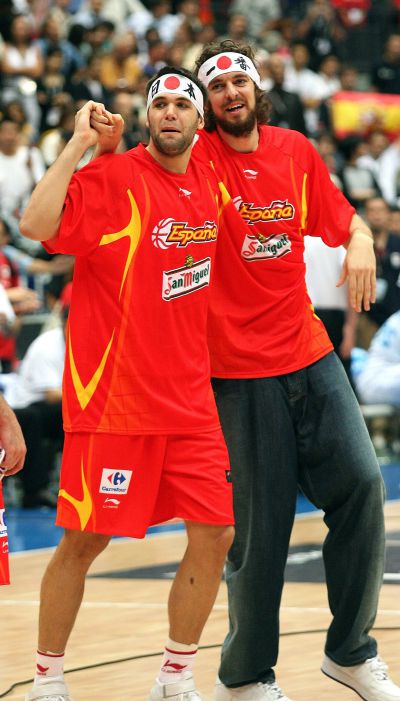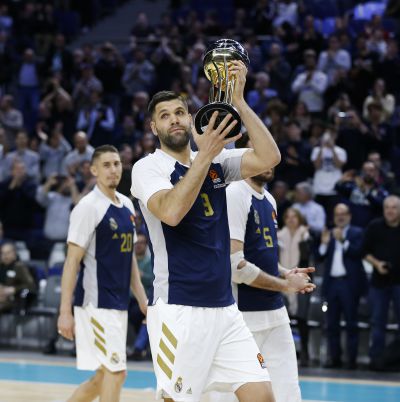By
One of the indispensable figures of the golden generation of Spanish basketball. An old school center who ended up doing almost everything and doing everything well. A captain who, above all, “always wanted the shirt and did everything possible to win the games,” as Clyfford Luyk himself defines it. That is Felipe Reyes (Córdoba, 1980), a player who reached the highest sporting heights, with the National Team and with his two clubs, Estudiantes and Real Madridand who will now enter the FEB Hall of Fame with all the merit that a legendary career gives him.
What does it mean for you to enter the FEB Hall of Fame?
A very important recognition. It is difficult to enter and it speaks of the career I have with the National Team. And also, of course, with my teams. To be among all these names you have to have achieved important things and I am very happy that they took me into account. And even more so when entering with friends like Pau.
Precisely together with Pau Gasol, another member of this batch, he was part of the Golden Juniors. Did the dreams you had then come true?

Enlarge
Koichi Kamoshida (Getty Images)
Our races have exceeded all of our expectations. We met in juniors first year and of course we dreamed of important things, but not that much. Him reaching the NBA and being decisive there. For me the best player in FIBA basketball. And I with everything I have achieved in my career in Europe and with the National Team. When we were 16 years old we couldn’t imagine something like this.
Pau was one of the Golden Juniors who reached the NBA. You were not in that group, do you have the thorn having tried there?
I don’t regret my career. It is true that the opportunity arose on occasion, but I do not at all regret having stayed at Real Madrid. I am very grateful to the club for the treatment they gave me at the time. I was very comfortable here and everyone’s interest in me continuing, from the president to the rest of the workers, meant that I had no doubts about my place.
Now it seems easier for young people in Europe to try their luck in the NBA, although many do so without being important here. What do you think?
I respect everyone’s decisions. My advice would be to hold on a little, to mature. It is true that there are cases of very young players who leave and succeed. Look at Pau or Luka. But if you have a place in the NBA, the doors will always be open for you, it is not always necessary to leave at the first opportunity that arises.
With another of the people with whom he will share entry into this Hall of Fame is Luis Scola, with whom he also experienced many things, although of a different kind.
The NBA? The opportunity presented itself, but I don’t regret having stayed at Real Madrid
With Luis we have had very nice confrontations, very tough too. At Estudiantes first and then at Real Madrid. Also with our selections. I think we have both learned, those duels have been good for us to improve as players. It is true that we had a great rivalry on the field, but that has stayed there. Although I have not met him in any locker room, I have met players who have been his teammates and they have all spoken very highly of him. The truth is that I am very happy that he enters the FEB Hall of Fame as a foreigner, which is even more difficult.
There is one thing in his game that stood out above the rest, his ability to grab rebounds. Is that born or done?
The truth is that I was always very good at it since I was little, I guess you have to carry a part of it inside. But it is also true that I trained him a lot, always. And in the end you have to have the desire, because the rebounds are often not taken by height, they are taken by intensity and by being heavy. You have to know how to position yourself, gain position from your rival. All of these are things that are trained. I would say that 50-60% is inside you and 40-50% is training.
I imagine that over the years many colleagues have asked you for advice.

Enlarge
EDUARDO CANDEL REVIEJO (DIARIO AS)
Yes of course. Especially the young people. I have tried to instill in them, as in so many other things, that they had to be persistent. To be a good rebounder you have to lose your fear of contact, which is something that takes a lot of effort throughout a game. But if you don’t lose that fear you will never improve.
Rebounding was his specialty, but over the years we saw him improve in other facets that were more difficult for him at first. If he even scored a three-pointer with his back turned in the Palace!
(Series) As a player you have to keep progressing. If you think you already know everything, that’s when you get stuck. I always had ambition to improve. For example, I was terrible at free throws and at the end of my career I even liked to shoot them in important moments, I felt comfortable in that situation. In the middle distance I also improved and, as the years went by, I started shooting triples. Maybe I could have started shooting from outside earlier, but that would have taken me away from the rim, it would have made me a different player. For me the main thing was always the rebound, being close to the rim. When I could, I went outside, but as a punctual resource.
Do you think that his departure from Estudiantes to Madrid could have been managed differently or is it impossible for such a transfer to be understood and accepted well by all parties?
I was terrible at free throws and in the end I even liked to shoot them in important moments.
The first thing I want to say is that I am very grateful to Estudiantes. There I started playing and they were the ones who gave me the first minutes as a professional, the ones who bet on me. But my dream since I was little was always to play for Real Madrid and when you get the offer it is very difficult to say no. Furthermore, Estudiantes were not going through a good financial moment and it was the board that forced my transfer to Madrid. They were the first to show interest. Of course, I am very grateful to Florentino Pérez, president at the time, who opted for me. Otherwise I might never have played on this team and would not have achieved all the successes I have achieved. It’s true that Estudiantes fans didn’t take it well, but they don’t know what really happened.
One of the most difficult moments of his career is the 2011 Eurobasket, which coincides with the death of his father. How does one deal with a situation like this?
It is the hardest blow of my career. I still remember being in Murcia, at the rally and receiving the news. My parents always went to see me at all the tournaments and I thought that the best tribute I could pay him was to play that Eurobasket and win it for him. Of course, the support and love that my colleagues gave me was very important.
For example, the detail that Juan Carlos Navarro, captain of Spain, had, allowing him to lift the champions’ cup.
There you realize the human quality that this group has always had. I think it was the first time he had to win a title with the National Team and he let me do it. It was a very nice gesture that I will never forget.
In his 15 years as an international he only missed one tournament. Now that there is so much talk about the recurring absences of players with their national teams, do you think basketball has gotten worse in this regard?
It is true that before there were not so many absences, the summer was for competing. But it is also true that the calendars are becoming harder, more demanding, and it is understandable that they decide not to go. They do it for a good reason, to avoid injuries and to be physically fit with their clubs. In my case, I also saw going with the National Team as a way to stay in shape, even if I had fewer vacations. For us it was a time of fun, getting together during those weeks. But it is true that in Spain there are almost never absences and that also speaks of the atmosphere that exists in the National Team.
Do you remember the atmosphere in the Madrid locker room after losing the 2013 and 2014 Euroleagues?
They were very hard moments. Along with injuries, losing finals is the worst thing there is, you end up very sunk. But seeing it constructively helps you improve, to try harder. That’s what that locker room did and that’s why we won the following year. I think that without the defeats of 2013 and 2014 we would not have won the 2015 Euroleague.
Do you remember the 2015 Euroleague or the 2018 Euroleague more fondly?
The first was more special for several reasons. The first, for which we have spoken, that we had just lost two in a row. Also because the club had not won it for many years. And finally, because we were able to do it in Madrid, in front of our people. But the second was also important because of how it was achieved. We finished fifth, we came back against Panathinaikos in the quarterfinals after they beat us in the first game, we played a piece of the Final Four…
Was Andrés Montes given the nickname Spartacus?
Yeah.
And do you feel identified?
The truth is that if. It is the nickname that I liked the most of all those that have been given to me, because of the sense of warrior, of gladiator that he has, which I think exemplifies my game well. Furthermore, I am very grateful that it occurred to someone like Andrés Montes, who is one of the people who has done the most for basketball in our country.
If you could relive one moment in your career, what would it be?
There are so many: the Cup with Estudiantes, the signing for Madrid, the Euroleagues, the Olympic medals… But I think I would go back to my beginnings, to play with that beautiful group with which it all started.
